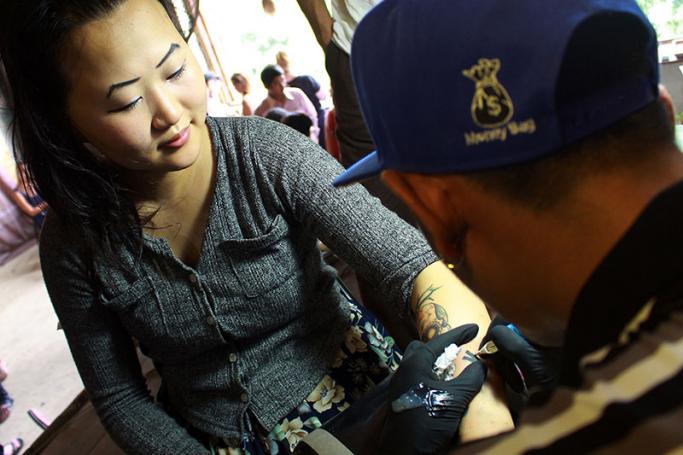Human Dignity Film Institute (HDFI) is currently hosting a six-day film festival on Human Rights in Yangon.
The Human Rights Human Dignity International Film Festival includes 67 films produced in Israel, Greece, North Korea, Spain and more, screened at three venues around the city, running from June 14 to 19.
HDFI was founded in 2012 by Min Htin Ko Ko Gyi upon his return from One World Human Rights Film Festival in Czech Republic. One of the biggest human rights film festival in the world and the largest in Europe, it had inspired the film maker to start one in Myanmar. The first festival took place a year later, on 15 June 2013. Over the following three years, more than 80,000 spectators attended the annual festivals. The institute expects approximately 12,000 spectators to attend this year.
The festival is an endeavour to advocate for an issue which had been long neglected in the country until recently. “Very few people in the country are aware of one’s own rights. Post 2011, we found space for meaningful activity. There was work to be done,” said Mon Mon Myat, organizer of the festival and colleague of Min Htin Ko Gyi.
Film is a compelling storytelling tool due to the engaging nature of the medium. In her felicitation letter to the first Festival, Aung San Suu Kyi said: “Sometimes, it is not enough for people to see the big picture just by simply writing or talking about the incidents of human rights violations…I believe that there will be many beautiful and artistic short films that enable us to understand the very essence and the value of human dignity and human rights.”
Ms. Mon Mon Myat recounted such incidence from last year. The current president U Htin Kyaw attended the 2015 festival, where he watched a film made by a student trained by the institute on a dispute surrounding a land confiscation that resulted in the arrest of 19 farmers. Moved by the film, he requested to meet the student, who was awarded a scholarship, and the detainees received amnesty. Ms. Mon Mon Myat said land confiscation has halted since.
The atmosphere is changing. “Originally the police stopped us when we distributed awareness-raising leaflets, but now we can carry on without interference,” Ms. Mon Mon Myat said. This year’s festival aims to bring about equally significant change of more humane policy: “We invite policy makers so that they can make decisions based on the films and the struggles they see in them.”
In addition to organizing the film festival, the institute recruits aspiring film makers from around the country. Training sessions are conducted in hopes of nurturing new film makers who will in turn contribute back to the festival and its overall aim to expand civil society dialogue on the matter of human rights and human dignity.
Concurrently, the festival has invited 120 volunteers to Pansodan Art Gallery to be tattooed with a character from the Human Rights Declaration. The letters inscribed on the participants will be photographed and arranged to spell out the passage from the declaration and uploaded online. The session commenced June 17.
Much like the tattooing session, which is free of charge and accepts voluntary donations, the institute is a non-profit organization, entirely dependent on external endowments. With the year-round tour of screening the films around the country and at universities coupled with the training sessions, there is little resource for fundraising activities. The institute hopes to secure funding and carry on as the country strives to solidify its democracy: “In the time of so-called transitional period, we are trying to push the boundary and see how much we can highlight.”
You are viewing the old site.
Please update your bookmark to https://eng.mizzima.com.
Mizzima Weekly Magazine Issue...
14 December 2023
New UK Burma sanctions welcome...
13 December 2023
Spring Revolution Daily News f...
13 December 2023
Spring Revolution Daily News f...
12 December 2023
Spring Revolution Daily News f...
11 December 2023
Spring Revolution Daily News f...
08 December 2023
Spring Revolution Daily News f...
07 December 2023
Diaspora journalists increasin...
07 December 2023
Call to remove ‘terrorist’ designation of Arakan Army












